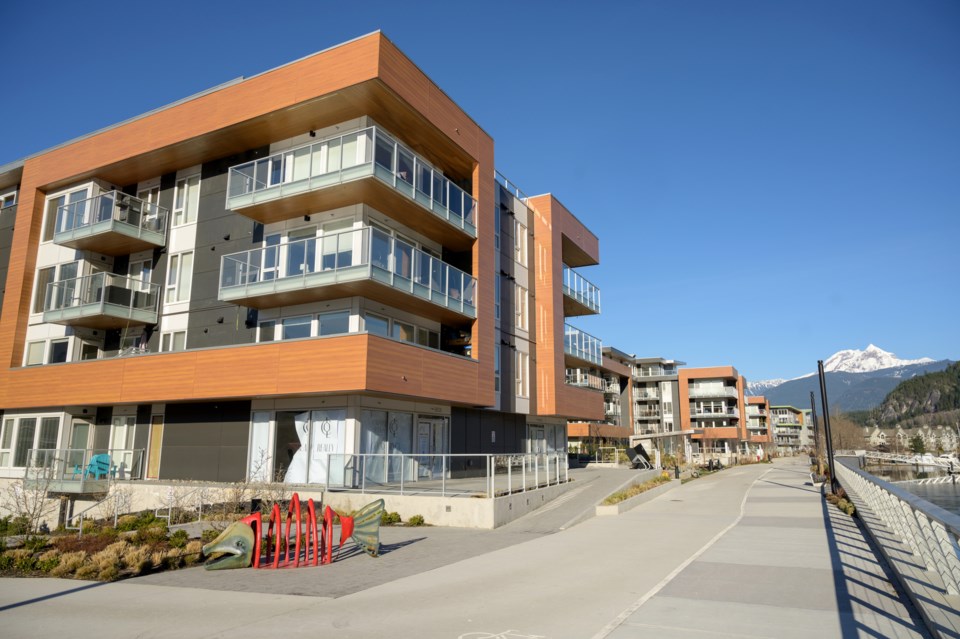If you have been on Squamish social media lately, you likely saw the posts from the environmental organization My Sea to Sky that say, "Woodfibre LNG is about to evict 30-plus families from the Sirocco One building in downtown Squamish."
"By housing workers in the One building, Woodfibre LNG is essentially creating an unregulated workcamp in downtown Squamish," continues the post, adding that studies show workcamps are dangerous for a myriad of reasons.
So is Woodfibre evicting folks?
A company spokesperson says no.
“Woodfibre LNG is not evicting anyone. A few years ago, we took out a lease on the Sirocco One building in downtown Squamish," reads an emailed statement from Woodfibre LNG's Jayne Czarnocki.
"The intention was — and remains — to provide housing for senior project employees and their families during construction. However, because construction was delayed and many units were unoccupied, we subleased some units to members of the local community on a fixed-term basis."
Since then, Czarnocki said some tenants have voluntarily chosen to move out, some leases have expired, and currently, 31 units remain occupied by local Squamish residents.
"When a fixed-term lease is approaching expiration, we always reach out to tenants several months in advance to advise that their sublease is coming to an end and connect them with a local property manager to find an alternative housing solution. Given the competitive rental and housing market in Squamish, our aim is to not adversely affect vacancy rates for locals," Czarnocki said.
The provincial government lists one of the legal ways to end a tenancy as when the “tenancy agreement is a sublease agreement that clearly states the subtenant will move out at the end of the term of the agreement.”
A District of Squamish spokesperson told The Squamish Chief that staff are aware “that WLNG leased one of the Sirocco buildings when it was first built to house their workforce. We’re aware that they subleased units in this building prior to them needing it.”
About sublets
Zuzana Modrovic with the Tenant Resource and Advisory Centre (TRAC ) said with a "normal" landlord, if they enter into a fixed-term tenancy agreement with the tenant, they can't just submit a vacate notice unless they plan to occupy the unit.
"Let's say you own an apartment, and you rent it out to somebody for a year or whatever. You can only include a term in the tenancy agreement that says that the tenant has to vacate at the end of the fixed term, if you intend in good faith to occupy the unit at the end. That's the only reason. You can't just sort of enter into a fixed term and have a vacate clause in there for no reason," Modrovic said.
"But these companies are purporting to sublet. They're renting the whole building and purporting to sublet the individual units, which makes it complicated."
She said, in theory, tenants whose subleases are ending could argue that they are not in a true sublet, she said, noting whether they would win in front of a B.C. Residential Tenancy Branch arbitrator is unknown.
The purpose of a sublet, in the Residential Tenancy Act, is so a residential tenant who needs to leave the unit temporarily can sublet it out to somebody else while they're gone and come back at the end of that temporary period that they need to be away for, Modrovic said. That is not strictly the case here.
She encouraged those in that situation who have questions about their options to reach out to legal renters advocates, including those at TRAC.
In terms of the tight housing market having an impact on such situations, she said the low rental vacancy rate in Squamish doesn't change whether or not something is allowed.
"I think that's the case in many places in B.C., unfortunately. But that doesn't really change the legal landscape. Either they're allowed to do this, or they're not. If a tenant wants to take the position that they're not, then they can go and do that at the RTB and get a binding decision."
The Squamish Chief also reached out to LandlordBC, but the organization declined to comment on this matter for this story.




